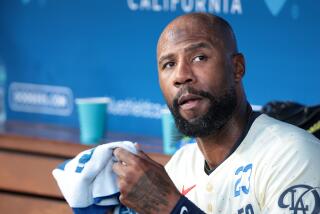Haywood Set Stage for Others to Play
- Share via
NBA training camps are in full swing, and that sound you hear is teenagers depositing millions of dollars in the bank. One person you won’t see cashing in is Spencer Haywood, the man who made it possible for all of these young kids to make money playing basketball while the rest of their would-be classmates are studying for midterms.
It was Haywood who fought the NBA all the way to the Supreme Court to end the rule that said players could not be drafted until their college class had graduated. He won and set the stage for hundreds of underclassmen to follow, from Julius Erving down to Tracy McGrady or whatever high school star has decided to leave school early this week. You just never hear about it.
When the NBA celebrated its 50th anniversary last year, there was no mention of Haywood and the monumental impact his case had on the league. When players leave college two or three years early or teenagers bolt straight from high school, they never think of Haywood when they’re signing their new contracts.
Haywood can actually laugh about missing out on big money; it has happened again and again. This was a guy who was offered a boatload of Nike stock in the 1970s, then was talked into taking the cash by his agent.
But if athletes want anything, it’s to be acknowledged for what they’ve done. For Haywood, that credit has come only sporadically, such as the award he received in Los Angeles on Sunday from the Black Sports Agents Assn.
It wasn’t easy to begin his professional career amid a flurry of lawsuits. One minute he’d be in the layup line, the next minute he’d be served court papers, declared ineligible for that night’s game and have to spend the next three hours sitting in a bus on a cold Milwaukee night.
And the lawsuit brought him a troublemaker label that he never could shed. Haywood brought enough problems on himself, from a drug addiction to disruptive behavior that led his Laker teammates to give him the boot and deny him a bonus share in the 1980 playoffs. But usually sports is quick to give players second chances. Not Haywood and his bad-guy stigma. It was as if he started off every at-bat with an 0 and 2 count. He was banished to Europe for a year. Despite averaging 19 points and nine rebounds in his NBA career, the only way he’ll get into the Hall of Fame is if he buys a ticket.
Haywood said the only modern player who thanked him for his contributions was Michael Jordan. He tries to talk to young phenoms but never gets past the receptionist. He once introduced himself to a young star as “the guy who fought the early entry ruling,” only to be told, “No you didn’t.”
That’s why, even though Haywood is proud of his landmark case, he says he wouldn’t follow the same path if he had to do it over again.
“You think I want this misery?” Haywood said. “I fought because I knew this would help a lot of African American people and bring economics to our community. If I had known that this was going to be like it is now, I would have never, ever put myself out like this. Because I’ve never been thanked for it. I’ve been cut off because of this, by those players who benefited from it.”
It has become fashionable to knock early entry now with the flood of youngsters jumping into the NBA. The current rules aren’t wrong, they’re simply being abused by too many players leaving school too soon. But if you’re against the concept of players leaving early you must not be a fan of the Lakers, who drafted Magic Johnson after his sophomore year at Michigan State. And there’s no way you could consider yourself a fan of the Chicago Bulls, who drafted Jordan after his junior year at North Carolina.
Haywood had two years of eligibility remaining as a 20-year-old in 1969. He had averaged 32.1 points and an NCAA Division I-high 22.1 rebounds at the University of Detroit. The previous year he scored 145 points and shot 72% in nine games to lead the United States to the Olympic gold medal in Mexico City.
He signed with Denver of the American Basketball Assn. and played a season there before signing with Seattle of the NBA.
“That was a revolutionary time,” Haywood said. “At that time, Curt Flood was fighting for baseball [and free agency], Muhammad Ali was fighting for boxing, so I guess basketball needed a bad guy.”
Haywood truly was a hardship case, as the rule used to be called (underclass players once had to prove financial need to be eligible for the draft), and his family lived in the poorest part of Mississippi.
He saw teenage players in baseball, hockey and tennis. No one complained about that. Haywood realized he was a commodity, just like the cotton he used to pick, and that NCAA basketball was a perfect farm system for the NBA, churning out polished prospects on someone else’s dime.
He has moved on with his life. He’s 48 and has been sober for 15 years. He is trying to spin his autobiography into a movie.
And he has spent time during the past 2 1/2 years working toward his arts and sciences degree, which he expects to have next year. If he had only spent two more years trying to get it when he was 20, he could have avoided so much stress and strife in his career. Maybe there would be no early entry lawsuit and we’d live in a world in which Magic was drafted by the Dallas Mavericks in 1981 and the New York Knicks had to choose between Jordan and Patrick Ewing with the first-ever lottery pick in 1985.
If Haywood didn’t do it, maybe somebody else would have. Then again, plenty of people came before him and didn’t try.
“Everybody had the chance to do it,” Haywood said. “They didn’t have the heart.”
Haywood did. But he almost wishes he didn’t.
“I thought it was the greatest thing in the world that I was doing,” Haywood said. “To see later on the outcome of it all . . . I would have rather stayed, I would have rather have seen the whole thing fall apart before I put myself out like this, to be the pariah, to have everything that I’ve earned taken away.”
It’s no stretch when Haywood says his case “changed sports as we know it.”
It’s a shame that he’s the only one saying it.
More to Read
Go beyond the scoreboard
Get the latest on L.A.'s teams in the daily Sports Report newsletter.
You may occasionally receive promotional content from the Los Angeles Times.










